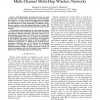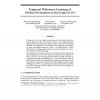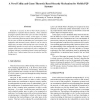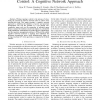1062 search results - page 89 / 213 » Game Networks |
176
click to vote
ICC
2009
IEEE
15 years 5 days ago
2009
IEEE
Typically, topology control is perceived as a per-node transmit power control process that achieves certain networklevel objectives. We take an alternative approach of controlling ...
121
click to vote
NIPS
1993
15 years 3 months ago
1993
The game of Go has a high branching factor that defeats the tree search approach used in computer chess, and long-range spatiotemporal interactions that make position evaluation e...
104
click to vote
PERCOM
2008
ACM
16 years 2 months ago
2008
ACM
Research on security in Peer-to-Peer (P2P) systems is dominated by reputation-based solutions. These solutions propagate opinions about other peers in order to help identify the b...
147
Voted
INFOCOM
2008
IEEE
15 years 8 months ago
2008
IEEE
—We consider a scenario in which users share an access point and are mainly interested in VoIP applications. Each user is allowed to adapt to varying network conditions by choosi...
129
Voted
ICC
2007
IEEE
15 years 8 months ago
2007
IEEE
Abstract— Wireless topology control is the process of structuring the connectivity between network nodes to achieve some network-wide goal. This paper presents a cognitive networ...




